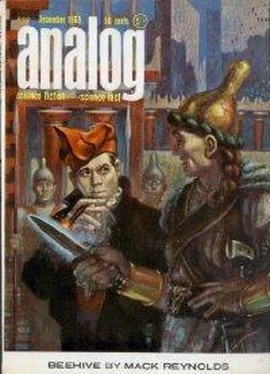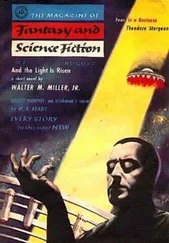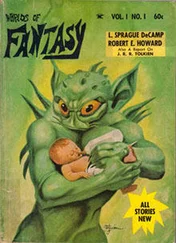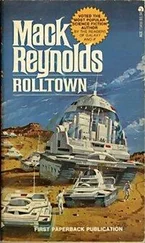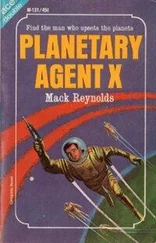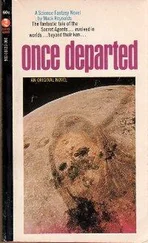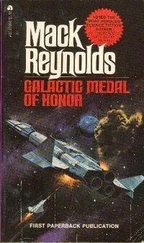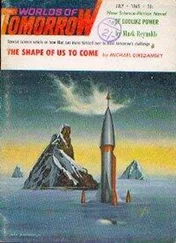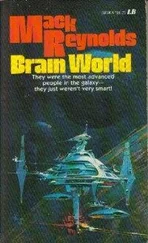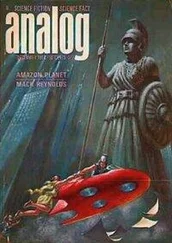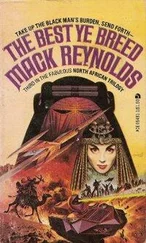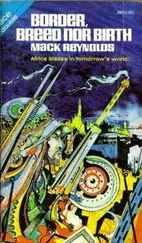Mack Reynolds - Dawnman Planet
Здесь есть возможность читать онлайн «Mack Reynolds - Dawnman Planet» весь текст электронной книги совершенно бесплатно (целиком полную версию без сокращений). В некоторых случаях можно слушать аудио, скачать через торрент в формате fb2 и присутствует краткое содержание. Год выпуска: 1965, Издательство: Condé Nast Publications, Inc., Жанр: Фантастика и фэнтези, на английском языке. Описание произведения, (предисловие) а так же отзывы посетителей доступны на портале библиотеки ЛибКат.
- Название:Dawnman Planet
- Автор:
- Издательство:Condé Nast Publications, Inc.
- Жанр:
- Год:1965
- ISBN:нет данных
- Рейтинг книги:5 / 5. Голосов: 1
-
Избранное:Добавить в избранное
- Отзывы:
-
Ваша оценка:
- 100
- 1
- 2
- 3
- 4
- 5
Dawnman Planet: краткое содержание, описание и аннотация
Предлагаем к чтению аннотацию, описание, краткое содержание или предисловие (зависит от того, что написал сам автор книги «Dawnman Planet»). Если вы не нашли необходимую информацию о книге — напишите в комментариях, мы постараемся отыскать её.
Dawnman Planet — читать онлайн бесплатно полную книгу (весь текст) целиком
Ниже представлен текст книги, разбитый по страницам. Система сохранения места последней прочитанной страницы, позволяет с удобством читать онлайн бесплатно книгу «Dawnman Planet», без необходимости каждый раз заново искать на чём Вы остановились. Поставьте закладку, и сможете в любой момент перейти на страницу, на которой закончили чтение.
Интервал:
Закладка:
“Fellow citizens of United Planets: When man first began to erupt into the stars, but a few centuries ago, his travels assumed a form that few could have foreseen. All but lemming-like, he streamed from the planet of his origin. And the form his colonizing took, soon lost all scheme of planning, all discipline. The fact was that any group that could float the wherewithal to buy or rent a space transport, or convert a freighter, could take off into the stars to found their own version of Utopia.
“And take off they did, without rhyme or reason. No, I recall that statement. Reasons they had aplenty: Racial reasons, religious reasons, political reasons, idealistic reasons, romantic reasons, socio-economic reasons, altruistic reasons and mercenary reasons. In a way, I suppose we duplicated, a hundredfold, the motivations the Europeans found to colonize the New World. The Spanish came with sword and harquebus in search of gold, ready to slaughter all who stood before them. The Pilgrims came to seek a new land, where they could practice a somewhat stilted religion, in a manner denied them at home. Large numbers of criminals came, either as convicts being exiled or fugitives from justice. Adventurers of every type zeroed-in, seeking their fortunes. Later, large numbers of Germans came, fleeing political persecution, and large numbers of Irish, fleeing famine.”
Ross Metaxa grunted, and flicked his heavy head. “And so it was in space. And in the early years, in particular, there was comparatively little friction. The galaxy is immense, and thus far, we have but touched a slightest segment of it. We are way out in a sparsely populated spiral arm, but there are still inhabitable planets in vast multitude and room for all. Every spacer-load of idealists or crackpots could safely find their habitable planet and settle down to go to hell in their own way.”
There was a mumble of discontent over the manner in which he was expressing himself, but he went on, ignoring the objections.
“However, in time, some of our more aggressive planets began to have growing pains. Planets, settled by such groups as the Amish, began to worry about their neighbors on the Planet Füehrerland. This had been settled by a disgruntled group of followers of a political leader of the 20th Century, who had come to disaster in his own time, but whose tradition came down through the years, somewhat distorted in his favor, as traditions are apt to become. Suffice to say that United Planets, based here on Mother Earth, came into being. Its purpose, of course, was obvious. To assist man in his explosion into the stars. The very basis of the organization was Articles One and Two of the United Planets Charter. Citizeness Kasansky, please.”
Irene Kasansky, without looking up, read into her desk mike. “Article One: The United Planets organization shall take no steps to interfere with the internal political, socio-economic, or religious institutions of its member planets . Article Two: No member planet of United Planets shall interfere with the internal political, socio-economic or religious institutions of any other member planet .”
Ronny Bronston knew, even as she read, that not only Irene, but everyone present in the hall knew the articles by heart. Metaxa was simply using this bit of business to emphasize his fling.
When she was done, Metaxa nodded ponderously. “Over the centuries, most planets, though not all, have joined up. Whatever their stated reasons, usually very highflown ones, the actuality is that each wishes the protection of the Charter. Each planet desperately holds on to its own sovereignty.”
There was a buzz again, and again he ignored it.
“Always remember, that within our almost three-thousand member planets are represented just about every political and every socio-economic system ever dreamed up by philosophers and economists since Plato, and every religion since the White Goddess, the Triple Goddess, prevailed throughout the Mediterranean. A planet whose economy is based on chattle slavery doesn’t want to have its institutions subverted by adherents of feudalism. And a planet with feudalistic institutions doesn’t want some entrepreneur from another planet, flying the flag of free enterprise, to come along with creeping capitalism. An atheistic planet, such as Ingersol, doesn’t want a bevy of fanatical missionaries from Byzantium, working away at its youth, which hasn’t been exposed to religion for centuries.”
His All Holiness of the Holy Theocracy of the Planet Bysantium called out in a fine rage. “I protest your levity, Commissioner.”
Ross Metaxa ignored him.
“All this is not new to you. But, somewhat over a century ago, matters changed, overnight and drastically. Our Spaces Forces brought in our little alien, there in the next room. Suddenly we had to face it. Man is not alone in the galaxy. Thus far, we had thought to be. Nowhere, in our explorations, though, admittedly, they have been but a pinprick on the chart of the Milky Way, did we find signs of intelligent life. Lower life forms, yes, occasionally. But never intelligent life of, say, even the order of the chimpanzee of Earth. But now we had to face the fact that there is intelligent, aggressive, scientifically and militarily advanced life in our galaxy; and, obviously, sooner or later, man, in his expansion into the stars, will come up against it. It was but a matter of time.”
Someone called out. “Perhaps this life form is benevolent!”
Ross nodded his shaggy head. “Perhaps it is,” he answered simply.
His words brought a deep silence. These were not stupid men and women. Largely, they were the cream of the planets they represented. The inference was obvious.
Ross Metaxa dropped another bomb. “So it was,” he went on, “that the nature of United Planets changed. Unbeknownst to the individual member planets, a new purpose for its being evolved.
There was heavy electricity in the air.
“No longer was it practical for man to allow such groups as the naturalists—who colonized the planet, Mother—to settle into their desired Stone Age society, rejecting all of man’s scientific advance down through the ages. No longer could we condone the presence among our number of the Planet Kropotkin, based on the anarchist ethic that no man is capable nor has the right to judge another. No longer were planets such as Monet to be borne.”
“Monet?” someone shouted in query.
Ross Metaxa said, “Originally colonized by a group of artists, musicians, painters, and sculptors, who had visions of starting a new race devoted entirely to the arts. They were so impractical that they crashed their ship, lost communication with the rest of the race, and, when rediscovered, had slipped into a military theocracy something like the Aztecs of Mexico. Their religion was based on that of ancient Phoenecia, including child sacrifice to the god, Moloch. Monet, too, claimed the benefits of Articles One and Two, wishing no interference with their institutions.”
The representative from Goshen, the bully-boy, who had had the run in with the Section G guards earlier, lumbered to his feet. His voice was dangerous. “And what was this new policy adopted by United Planets, unbeknown, as you say, to the member planets themselves?”
The Commissioner made a gesture with a heavy paw. “Is it not obvious, Your Excellency? It became the task of United Planets, though but a fraction of us have been privy to the fact, to advance the human race, scientifically, industrially, culturally, socio-economically, as fast as it was possible to do so.”
“Even though Articles One and Two, the very basis of the Charter were violated?”
The shaggy head lowered, and Ross Metaxa glowered out at them, in their shocked silence. “No matter what was being violated,” he growled.
Читать дальшеИнтервал:
Закладка:
Похожие книги на «Dawnman Planet»
Представляем Вашему вниманию похожие книги на «Dawnman Planet» списком для выбора. Мы отобрали схожую по названию и смыслу литературу в надежде предоставить читателям больше вариантов отыскать новые, интересные, ещё непрочитанные произведения.
Обсуждение, отзывы о книге «Dawnman Planet» и просто собственные мнения читателей. Оставьте ваши комментарии, напишите, что Вы думаете о произведении, его смысле или главных героях. Укажите что конкретно понравилось, а что нет, и почему Вы так считаете.
